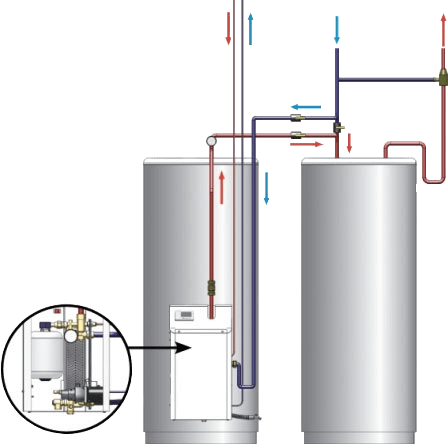Just imagine having a shower, cleaning dishes or doing laundry with free solar thermal energy!
Hot water is the second highest utility cost in a typical household, after space heating. It represents about 35% of total energy consumption in our homes, according to Environment Canada. Japan and Germany are current leaders in the solar markets, yet BC’s climate shows greater solar potential than both countries. Does solar work here? Yes, it does!
Terratek has installed hundreds of solar hot water systems (solar thermal) on residential homes across British Columbia, winning Contractor of the Year with SolarBC for all three years of the program’s run. SolarBC went on to become the most successful solar pilot program in Canada, out of 14! We have also installed solar water heating systems on over 30 schools in the province, as well as multiple municipal buildings.
Solar Water Heating For Your Home
Installing a solar thermal energy system is one of the most reliable and cost-effective renewable solutions to reducing your electric or gas bill. When properly installed a system can provide up to 60% of your annual water heating, enabling year-round savings on your utility bill.
How Solar Hot Water Systems Work
Sunlight is converted into heat through solar panels (collectors) mounted on the roof. Water, or a water/antifreeze solution, carries heat from the panel(s) and pumps it through a heat exchanger to a tank for storage and subsequent use. The solar panel is mounted on or near your home facing south. As the sunlight passes through the glazing, it strikes an absorbing material. This material converts the sunlight into heat while the glazing prevents the heat from escaping.
Heat energy is then transferred through a heat exchanger and into the water storage tank. Solar-heated water is then stored in an insulated tank until you need it. Hot water is drawn off the tank when tap water is used, and cold make-up water enters at the bottom of the tank.

Solar Hot Water For Your Pool
Solar water heating will instantly reduce your pool costs, while extending your season by several weeks and reducing carbon emissions. Solar thermal energy for outdoor pool heating is generally done with unglazed collectors. Unglazed collectors cost less and typically offer payback periods ranging from two to five years. These collectors are easy to install and can be integrated in either existing or new pools.
For indoor pools and hot-tubs, glazed collectors identical to those found in solar water heating systems for homes are more appropriate.
